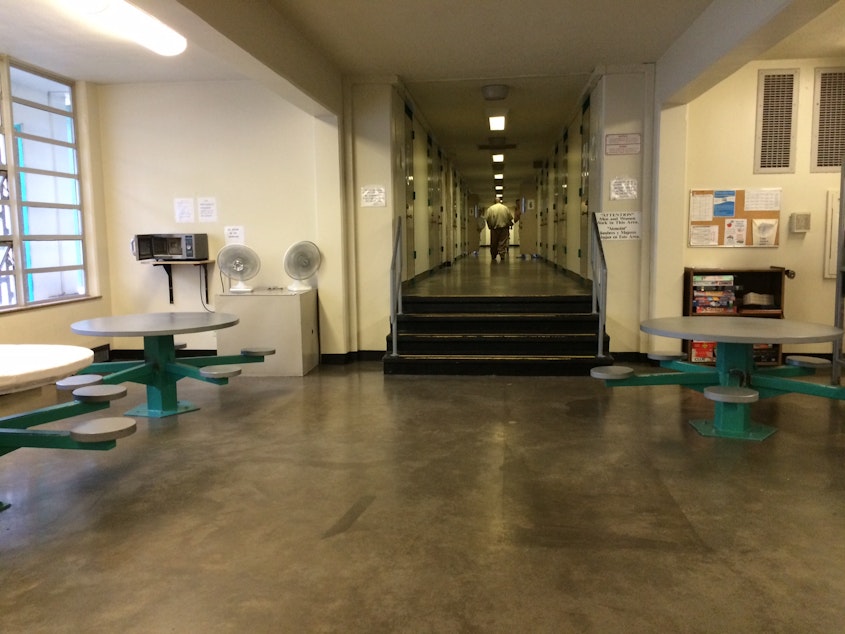A Washington Prison Unit Where 'No One Picks On You For Being Slow'

Prison is no place to be vulnerable. For inmates with intellectual disabilities, autism or traumatic brain injury, it can be dangerous.
They’re easily be exploited their peers and they have trouble remembering rules, which can lead to disciplinary action and segregation from other inmates.
Bradley Fulton, an inmate at the Washington Correction Center in Shelton, said he’s been told he has autism. “I have a speech impediment. I stutter a lot when I’m in the middle of talking. Stuff like that,” he said. “People they just kind of nitpick at stuff like that.”
Fulton is in the Skill Building Unit, a small prison program in Washington state that has been attempting to better address the needs of this special population for the past year. Fulton said in this unit no one picks on you for being slow.
An Alternative To Segregation
Sponsored
For people with low intellectual function or a traumatic brain injury, life in prison can be scary. Amy Czerwinski, a health care manager for the Department of Corrections, designed the Skill Building Unit with her team.
It’s in a storage space that has been converted into a learning environment. An elaborate Halloween display of pumpkins and gourds line the beige walls, reminiscent of an elementary school classroom.
At a long table mental health counselor Nikki Rymer, helps two inmates complete workbook exercises designed to help build self-awareness and self-respect. Inmates also participate in basic skills classes, like dental hygiene.
The environment is so unlike prison, it’s almost easy to miss the two corrections officers keeping watch in a glass enclosed booth in the corner.
Angela Browne, of the Vera Institute of Justice, thinks that an alternative like this unit is in everyone’s best interest. “Anytime there’s an acute incident that’s money. And segregation uses so much space. So in the long run it’s in the state’s interest. It’s in the taxpayer’s interest,” she said.
Sponsored
Browne says by looking for alternatives to segregation specialized units like the one at WCC are helping to flip the paradigm for some inmates.
Some inmates with challenges try to get along in prison by being compliant. That leaves them ripe for manipulation and abuse. But the opposite can have consequences just as detrimental.
Czerwinski said sometimes the symptoms of traumatic brain injury, or TBI, can be mistaken for noncompliance; like if an offender is directed to do a task he doesn’t understand very well.
“He may get it the first time but then he forgets,” she said. “Then he’s just kind of sitting around and so they think he’s just sitting around. So some of the officers (might say) I already told you how to do this one time!”
An interaction like that can lead to disciplinary sanctions. And in the worst case, segregation. Experts from the Vera Institute say segregation is extremely detrimental to these inmates.
Sponsored
“People who are strong, without disabilities, decompensate,” Browne said. But she said when vulnerable inmates come out of isolation they’re depressed, anxious and confused.
By grouping together vulnerable inmates in special housing, WCC has created a safer, more accepting environment. They’re also housed among inmates from the general population, some of whom act as social and educational mentors.
Browne says the mentors’ role is especially important since some inmates in this program will eventually return to the general population or be released. “You need to practice those skills with people who aren’t struggling with your particular challenges,” she said.
‘A Safe Person’
Psychology associate Jane Craig is assigned to the Skill Builder Unit. Her desk fits neatly into the converted cell space at the end of the units housing tier.
Sponsored
For regular inmates, getting access to a mental health counselor can often be a difficult, drawn out process. So having access to someone like Craig is a luxury.
“They walk by here all day long. They knock on the window just to say ‘hi.’ I think it gives them some assurance and safety. Because I’m not custody so, it’s like a safe person,” she said.
Craig says her presence can help defuse situations before they become critical incidents. “This population has a tendency to not have very good coping skills. So they get ramped up real easy if there’s changes and all that.”
The 60 people in this program are just a small fraction of the 1,500 or so inmates who the DOC has identified as having an IQ of lower than 80.
The program’s budget is close to half a million dollars, and it’s unlikely to grow anytime soon. Budgets are tight and the DOC has no plans to ask for more money.
Sponsored
As for inmate Brandon Fulton, he has completed his GED. He’s scheduled to be released this week and hopes to attend college.

